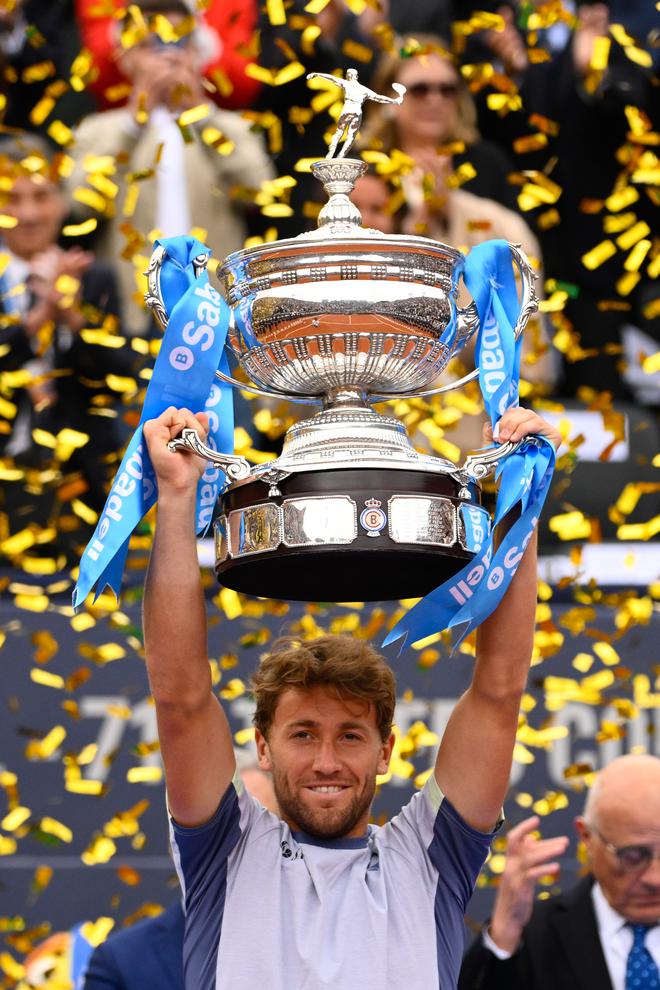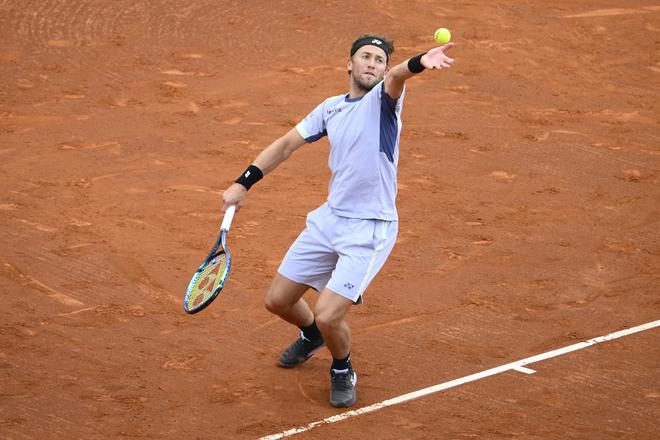It’s not unreasonable to surmise that a player good enough to reach three Grand Slam finals and peak as high as World No. 2 would have also tasted success at at least one ATP 500 or Masters 1000 event. Anything to the contrary would seem incongruous.
And yet that was the situation Casper Ruud found himself in until last week. A former junior World No. 1, the Norwegian was long regarded as one of men’s tennis’ hottest young prospects — but his lack of titles in the tour’s bigger tournaments meant that questions were beginning to be asked about whether Ruud was truly a ‘top top’ player.

Answering the doubters
The 25-year-old finally answered the doubters at the Barcelona Open, defeating Stefanos Tsitsipas — a week after losing to the Greek in the Monte-Carlo Masters final — to win the 500-level event, the biggest title of his career.
Ruud’s straight-set victory also earned him his first title of the season, after three runner-up finishes, and his first trophy since Estoril in April 2023.
“Honestly, this has been worth the wait,” Ruud said. “A lot of finals that I’ve lost have been tough. Any time you reach a final, it’s nonetheless a good week, so you can’t be too hard on yourself, but this one has been a long time coming.
“It means a lot, this is the biggest title of my career, it’s something I’ve chased for a long time already,” he told Teledeporte. “I’ve never won a 500 before or a 1000. The last six, seven months I’ve taken a few steps in the right direction in my game and I’m glad it’s paying off.”
Tsitsipas had comfortably won in Monte Carlo, but this time Ruud turned the tables. Asked what he had done differently, Ruud said, “Just to kind of [bring] it to him a little bit more. In Monte Carlo, I was always on the back foot, too far behind, and he had too much time to control the game.”
The victory tasted even sweeter because it came on a court named after his idol. “I’m super happy to do it here in Barcelona in front of a packed stadium and on Rafa Nadal Court,” he said. “It’s special to me because I looked up to him [Nadal] all my childhood, came here myself as a 13-year-old boy to watch him and the others play here. It’s a great feeling.”
Unclogging a mental block
At Monte Carlo, Ruud had spoken of his disappointment of not getting it done in the bigger events. “I want to break the barrier and win a big tournament like this,” he said. While he did not break that specific barrier in the Principality, he did shatter another. Until his semifinal against record 24-time Major winner Novak Djokovic, Ruud had lost all five of their previous meetings. Indeed, he held a 0-11 record against top-three players at that point in time.
With the match tied at a set apiece, Ruud had a mental breakthrough: he relaxed, played some of his best tennis and calmly closed out the victory against one of the hardest players to beat in tennis history. “Beating a world number one is something I have never done,” Ruud said. “You know how good these guys are under pressure… This is a day I will remember for a long time.”
If the victory over Djokovic was affirmation that Ruud could beat the truly elite, the Barcelona triumph proved that he could hold his nerve with everything on the line in the bigger events. Both instances featured a braver, more proactive style under pressure — a consequence, he said, of staying in the moment.
“Sometimes you play your best tennis when you don’t think too much,” he said. “It just goes into automatic mode. I play my best when I’m cool and don’t think too much about it out there.”
If Ruud can do this more consistently, it will add another gear to his smooth modern baseline style. Despite possessing a heavy, powerful forehand, the 25-year-old can sometimes be guilty of passive tennis, engaging in backhand cross-court exchanges, instead of looking to pull the trigger on his forehand. At an even 6’0”, Ruud is not going to blow people off court with raw power, but he has enough forehand muscle to pick his moments to end points.
Overcoming small margins
Given how solid Ruud’s ‘floor’ is — two-time Major winner Carlos Alcaraz once said that “beating Casper means you are playing well [because] it is really tough, big rallies” — the added ability to shorten points in the big moments, when needed, will raise his ‘ceiling’. With how small the margins in top-flight tennis are, that could prove the difference at the business end.
“I feel like I’m improving as a player but it’s just the margins are so small at this level these days,” he said. “There’s not just 10 or 20 guys that can play well, it’s 80 or 100 guys.”
Ruud’s mental game has benefited from the experience of overcoming a slump. After a successful 2022, during which he rose as high as No. 2 before ending the year at No. 3 after reaching the championship match at the ATP Finals, the Norwegian struggled for much of 2023.
“It’s not fun at all,” Ruud told rolandgarros.com. “As tennis players we live off trying to win matches, that’s sort of everything we have. When you lose early you’re like, ‘What’s going on? Am I worse? Are other players much better?’
“It’s always like this constant battle to try to win as many matches as possible; you sort of start thinking when you lose more than you would like, what am I doing wrong? It was a season to try to gain experience from competing as a top three or top five member.”
In 2023, Ruud did, however, have another excellent run at Roland-Garros, matching his 2022 performance by reaching the final.
“I believed more and more that what happened [in 2022] was not a one-hit wonder,” he said at the time. “This Roland-Garros might have been very important for my career to build my future… hopefully one day I’m going to aim for a Slam title. That’s my biggest goal, my biggest dream. It’s been close, but no cigar, so I’m going to keep working and try to get it one day.”

With 10 of his 11 career titles coming on clay, Ruud is eyeing next month’s French Open as another opportunity to break the glass ceiling at the Majors. Having been beaten in title rounds by Nadal (2022 Roland-Garros), Alcaraz (2022 US Open) and Djokovic (2023 Roland-Garros), the Norwegian will be hoping his recent mental breakthroughs help him take the next step.
Ruud knows that players don’t get classified in the top bracket until they win a Grand Slam title. Given the depth in men’s tennis, he won’t have it easy. But the recent weeks show that he has begun to believe he has it in him. At this level, that can make all the difference.







